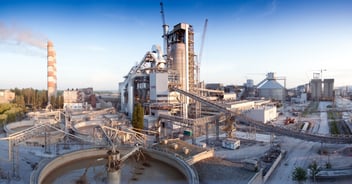

The cement industry is essential for global infrastructure. A hydraulic binder, cement hardens when mixed with water, forming a strong and durable material for construction and industrial projects. The global cement demand is projected to increase by 2.4% annually from 2022 to 2026, reaching an estimated 4.8 billion metric tons by the end of that period. India's cement demand is projected to reach 419.92 million metric tons by fiscal year 2027, fueled by growing demand from various sectors, highlighting the need for a dedicated ERP for cement industry.
The multiple challenges faced by the cement players, despite the rising global demand, highlight the need even more. Cement manufacturers have to navigate various hurdles to deliver orders on time and meet customers' specific requirements as in this competitive landscape, exceeding customer expectations is crucial for long-term success. Simply meeting customer demand is not enough; manufacturers must prioritize delighting customers to build lasting relationships, foster loyalty, and enhance their brand reputation. This not only leads to repeat business but also generates positive word-of-mouth, a powerful marketing tool in the industry. While the project-based nature of orders, evolving compliance regulations, and intense competition can pose obstacles, a robust ERP solution can significantly improve customer satisfaction and help cement manufacturers thrive in this demanding environment.
However, before proceeding with how an ERP for cement industry can be a game-changer, it’s important to identify key customer pain points and their expectations.
Understanding Customer Pain Points and Expectations in the Cement Industry
The industry faces diverse customer needs and expectations that only a dedicated ERP for cement industry can deliver. Some of the customers’ pain points and expectations are mentioned below:
| Pain Points | Expectations |
| Quality Concerns: Customers often face quality issues like uneven cement strength, poor workability, and early setting that can be solved with insights from ERP for cement industry. These issues lead to structural problems in construction. | High-Quality Cement: Customers expect consistent and reliable quality in cement products to ensure the structural integrity and durability of their projects. |
|
Delivery delays: Unreliable or late deliveries disrupt schedules and lead to financial losses. Restrictions on trucks' movement during the daytime and permission to access major connecting roads only in the odd hours disrupt the despatch planning. |
Timely Delivery: Customers value timely delivery of cement to avoid project delays and disruptions in their construction schedules. |
|
Price Fluctuations: Cement prices can be volatile, making it difficult for customers to plan their budgets and manage costs effectively. |
Affordability: Customers expect competitive prices, especially in regions with high costs of construction, without compromising quality. |
|
Lack of Transparency: The absence of a dedicated ERP for cement industry limits customers' transparency into the supply chain and pricing, making it challenging to track material origins, ensure quality, and verify cost breakdowns and sustainability claims.. |
Transparency and Traceability: Customers want transparency in the cement supply chain and pricing to ensure quality, sustainability, and traceability. |
|
Environmental Concerns: Customers are increasingly aware of the environmental impact of cement production. They demand more sustainable products and practices and expect companies to reduce their carbon footprint. |
Sustainability: Customers seek products with a lower environmental footprint, such as those made with alternative fuels or reduced carbon emissions. With real-time data and insights from ERP for cement industry, businesses can achieve a lower carbon footprint. |
|
Customer Service: Customers often face challenges like inconsistent communication, delayed deliveries, and difficulty obtaining technical support or resolving issues. |
Customer Service: Customers expect suppliers to be responsive to their needs. They seek suppliers who provide timely support, address their concerns, and offer personalized solutions: everything possible with ERP for cement industry. |
How ERP Systems Can Enhance Customer Service
ERP for cement industry can be a great tool for manufacturers not only to address the pain points of customers and exceed their expectations but also to enhance their overall productivity. Below discussed are some ways ERP solutions can contribute:
-
Order Management and Fulfillment:
ERP for cement industry revolutionizes customer service by automating order processing, ensuring real-time inventory visibility, and optimizing the allocation of resources like crushers, grinders, kilns, coolers, mixers, and packaging machines. This powerful tool enables accurate demand forecasting, timely deliveries, and enhanced communication. ERP solutions also enable real-time tracking of raw materials like limestone, clay, gypsum, iron ore, etc., needed for timely order fulfillment and proactive issue resolution, ultimately improving customer satisfaction and building stronger relationships.
-
Quality Control and Assurance
ERP for cement industry empowers companies with real-time traceability, QMS integration, and data-driven insights for enhanced quality control. By tracking raw materials, monitoring production, and analyzing quality metrics, companies can proactively address issues like variations in limestone composition, impurities in clay and shale, and excessive moisture in coal. Accordingly, they can select reliable suppliers and manage product recalls efficiently. Moreover, ERP systems enable customer feedback analysis, fostering continuous improvement and ensuring products consistently meet high standards, resulting in enhanced customer satisfaction.
-
Sales Management and Automation
ERP systems revolutionize sales management by automating processes, enhancing data accuracy, and providing real-time insights. This empowers businesses to deliver superior customer experiences. By integrating CRM, automating order processing, and enabling real-time quoting, ERP for cement industry streamlines operations and reduces errors like incorrect pricing calculations, the use of damaged additives or chemical admixtures, etc. Moreover, sales force automation, performance tracking, and inventory management ensure efficient sales execution and timely order fulfillment. These combined benefits result in higher customer satisfaction, increased sales, and improved overall business efficiency.
-
Supply Chain Management
By integrating with production planning, inventory control, and transportation modules, ERP software provides real-time visibility into the entire supply chain. This enables companies to optimize production schedules, manage inventory levels effectively, and ensure timely deliveries. For instance, ERP for cement industry can identify potential supply chain bottlenecks, such as lack of communication with suppliers about the chemical composition of minerals, particle size distribution, impurity levels, or transportation delays, and take proactive measures to mitigate their impact. This ultimately results in more reliable and efficient delivery of cement to customers, enhancing their overall satisfaction.
-
Customer Relationship Management (CRM)
ERP for cement industry can streamline CRM processes by integrating customer data, sales orders, and inventory management. This allows for better customer segmentation, targeted marketing campaigns, and efficient order fulfillment. For instance, an ERP system can track customer purchase history to identify high-value customers and offer personalized promotions. Additionally, it can optimize inventory levels based on customer demand, reducing stockouts and improving order delivery times, ultimately enhancing customer satisfaction.
Real-World Evidence: How ERP Helped a Cement Manufacturer
Eagle Cement Corporation, a leading cement manufacturer in the Philippines, faced challenges with order fulfillment due to a spike in demand that threatened customer satisfaction. Ramco's integrated ERP for cement industry provided real-time cost tracking, asset management, predictive maintenance, and performance visualization for the cement industry, enabling streamlined operations and improved decision-making. This enabled streamlined operations, leading to faster turnaround times, prompt order fulfillment, and enhanced customer satisfaction.
Unlock the Potential of Your Cement Business
Delivering customer delight in the cement industry requires a holistic approach that addresses various customer pain points and expectations. ERP systems offer a comprehensive solution by streamlining operations, enhancing efficiency, and improving customer satisfaction. By effectively managing orders, ensuring quality, automating sales, optimizing the supply chain, and fostering customer relationships, ERP for cement industry empowers manufacturers to deliver exceptional customer experiences.
To thrive in today's competitive landscape, cement manufacturers must embrace continuous improvement and adapt to evolving customer needs. By leveraging ERP for cement industry and implementing best practices, businesses can differentiate themselves, build long-lasting relationships, and achieve sustainable growth. Discover how Ramco ERP can help unlock the potential of your cement business and deliver exceptional customer value.


